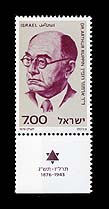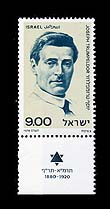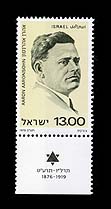|
Arthur Ruppin
Arthur Ruppin, "father of Zionist settlement", was born in Rawicz, Prussia, in 1876. For family reasons, he was obliged to leave school at the age of 15, and worked for eight years before entering Berlin University where he studied law, economics and natural sciences. After qualifying, Ruppin worked as a lawyer and directed the Jewish Statistical Bureau in Berlin from 1903 to 1907. His knowledge of Jewish sociology deepened, and in the course of his research he wrote several books on the subject.
Ruppin became identified with practical Zionism and in 1907 gladly accepted the Zionist Organization's request to examine the possibilities of Jewish settlement in Palestine. From that time on Ruppin was part of the Zionist movement, his first appointment being to head the Organization's Palestine Office in Jaffa in 1908.
Expelled by the Turks in 1916, Ruppin returned three years later, having kept constantly in touch with the Yishuv. From 1926 he taught sociology at the Hebrew University, in 1933 took charge of the Agency's resettlement programme and from 1935 directed the Institute for Economic Research. Ruppin's best work was in the field of settlement, for he brought in thousands of refugees from Nazism, and in the purchase and reclamation of land. He acquired much of the Jezreel Valley for the Palestine Land Development Corporation and the Jewish National Fund, encouraged land acquisition around the Tel Aviv area, bought large tracts of the Carmel for Haifa's growth, and obtained properties from the Greek Church for the establishment of Jerusalem suburbs. Ruppin's death at the age of 67 put an end to a brilliant career.
Joseph Trumpeldor
Joseph Trumpeldor has become a national symbol of bravery and self-sacrifice. The son of a soldier in the Czarist army, he was born in the Northern Caucasus in 1880, and, as a youngster, became attracted to the Tolstoyan idea of communal living. He soon turned his Zionist-oriented thoughts to the establishment of such communes in the Land of Israel.
Drafted into the army during the Russo-Japanese war, Trumpeldor volunteered for special assignments, losing his left arm during the fighting around Port Arthur in 1904-5. A prisoner of war from 1904 to 1906, he then returned to Russia, studied law and immigrated to Palestine in 1912. At the outbreak of World War I he was deported to Egypt, where he organized the Zion Mule Corps as the forerunner of a Jewish fighting unit. Leading the Zion Mule Corps, Trumpeldor fought for the British at Gallipoli, was demobilised in London and helped Jabotinsky found the Jewish Legion. The year 1917 saw him back in Russia training young Jews in the framework of the He-Halutz movement in preparation for their immigration. Trumpeldor himself came home to Palestine two years later and was asked to organize the defence of Upper Galilee settlements against Arab violence. Trouble soon began. On March 1st, 1920 Tel Hai was attacked and Trumpeldor fatally wounded. He and his companions who died with him are buried near Tel Hai, where a memorial erected in 1934 is inscribed with Trumpeldor's last words:
"It is good to die for our country".
Aaron Aaronsohn
Aaron Aaronsohn was born in 1876 in Rumania and immigrated in 1882 to Eretz-lsrael with his parents, who were among the founders of Zikhron-Ya'aqov, where Beit Aaronsohn stands housing a botanical museum and library, and the family home.
Aaronsohn studied agriculture in France and became an instructor and adviser on agricultural and technical matters. In 1906 he discovered the Emmer Wheat ("Triticum dicoccoides") in the Galilee. This discovery, as well as other scientific papers published in a number of botanical monthlies, brought Aaronsohn world-wide renown. In 1910 he travelled to the United States where he came in touch with some influential Jews who helped him establish an agricultural experimental station at Athlit, on the coast south of Haifa. The outbreak of the first world war made a deep impact on the life of Aaron Aaronsohn. As an international figure he was a member of a committee which allocated funds sent from the USA to the Jews of Palestine. His contacts with the Turkish authorities convinced him that under this cruel and corrupt regime the Zionist cause would not flourish. He therefore organized an underground intelligence service known as "Nih", which was based at the Athlit station, where British ships would come surreptitiously to collect messages.
The Nih group was composed of Aaronsohn's friends and family, and included his brother Alexander and his sister Sarah. Sarah was arrested in 1917 and after being tortured by the Turks for three days shot herself without revealing any of the Nih secrets.
Aaron Aaronsohn continued to be active on the world Jewish scene and was highly thought of by Dr. H. Weizmann who, in 1918, included him in the Zionist Council of Palestine. He acted as expert to the Zionist delegation to the Versailles Peace Conference in the question of the boundaries for the British Mandate. Flying on this mission from London to Paris on 15 May 1919 his plane crashed in the British Channel and he was reported missing.



